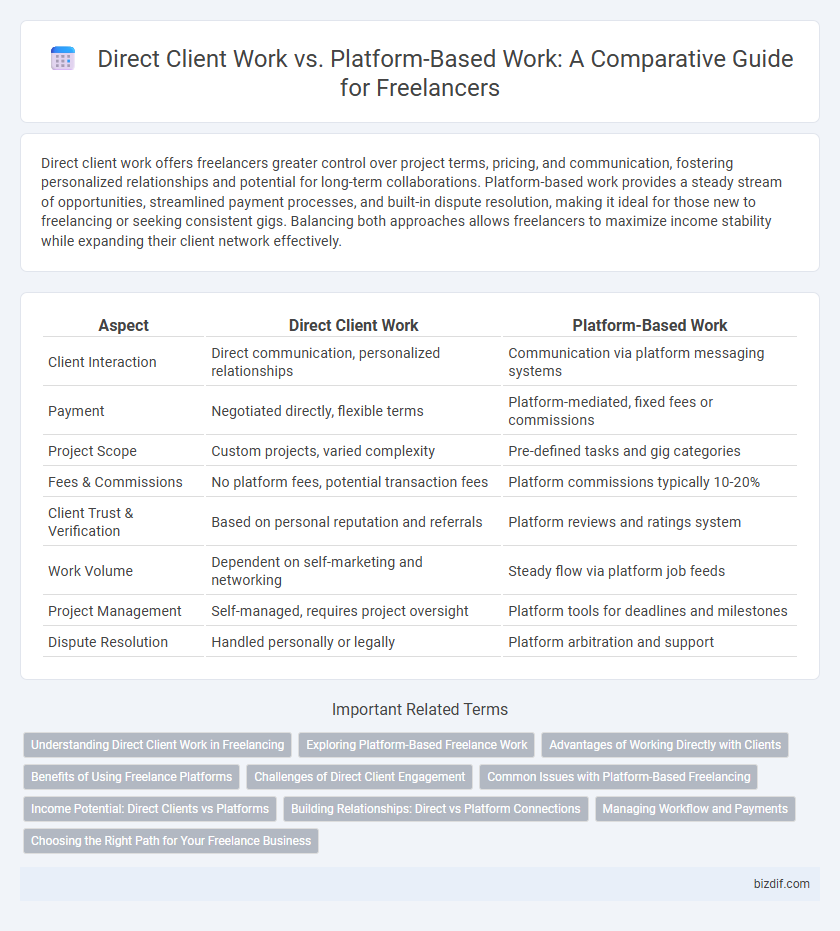Direct client work offers freelancers greater control over project terms, pricing, and communication, fostering personalized relationships and potential for long-term collaborations. Platform-based work provides a steady stream of opportunities, streamlined payment processes, and built-in dispute resolution, making it ideal for those new to freelancing or seeking consistent gigs. Balancing both approaches allows freelancers to maximize income stability while expanding their client network effectively.
Table of Comparison
| Aspect | Direct Client Work | Platform-Based Work |
|---|---|---|
| Client Interaction | Direct communication, personalized relationships | Communication via platform messaging systems |
| Payment | Negotiated directly, flexible terms | Platform-mediated, fixed fees or commissions |
| Project Scope | Custom projects, varied complexity | Pre-defined tasks and gig categories |
| Fees & Commissions | No platform fees, potential transaction fees | Platform commissions typically 10-20% |
| Client Trust & Verification | Based on personal reputation and referrals | Platform reviews and ratings system |
| Work Volume | Dependent on self-marketing and networking | Steady flow via platform job feeds |
| Project Management | Self-managed, requires project oversight | Platform tools for deadlines and milestones |
| Dispute Resolution | Handled personally or legally | Platform arbitration and support |
Understanding Direct Client Work in Freelancing
Direct client work in freelancing involves collaborating with clients independently, bypassing third-party platforms to establish personalized contracts and communication channels. This approach often leads to higher earnings since freelancers avoid platform fees and can negotiate terms based on their expertise and project scope. Building a reliable network and maintaining strong client relationships are crucial for consistent workflow and professional growth in direct client engagements.
Exploring Platform-Based Freelance Work
Platform-based freelance work offers access to a global marketplace with diverse project opportunities in fields such as graphic design, programming, and writing on sites like Upwork, Fiverr, and Freelancer. These platforms provide streamlined payment processing, project management tools, and client reviews that build freelancer credibility and help secure future gigs. Leveraging algorithm-driven job matching and dispute resolution features enhances the efficiency and security of managing freelance careers remotely.
Advantages of Working Directly with Clients
Working directly with clients offers greater control over project scope, timelines, and pricing, leading to improved profit margins for freelancers. It enables personalized communication, which fosters stronger professional relationships and a clearer understanding of client needs. This direct interaction reduces dependency on platform fees and algorithms, providing more financial transparency and stability.
Benefits of Using Freelance Platforms
Freelance platforms offer streamlined access to a global client base, enhancing project diversity and income potential for freelancers. These platforms provide secure payment systems and conflict resolution mechanisms, reducing financial risk and fostering trust. With integrated tools for portfolio showcasing and client communication, freelancers can efficiently manage workflows and build professional reputations.
Challenges of Direct Client Engagement
Direct client engagement in freelancing often presents challenges such as inconsistent project flow, difficulties in client acquisition, and lack of payment security. Freelancers must invest significant time in negotiation and contract drafting, increasing administrative overhead compared to platform-based work. Managing communication and expectations directly with clients requires strong interpersonal skills to avoid misunderstandings and scope creep.
Common Issues with Platform-Based Freelancing
Platform-based freelancing often presents challenges such as high competition, leading to lower rates and difficulty in securing consistent projects. Freelancers frequently face platform fees that reduce overall earnings and restrictive policies that limit direct client engagement. Miscommunications and delayed payments are common issues due to the intermediary role of these platforms, impacting trust and workflow efficiency.
Income Potential: Direct Clients vs Platforms
Direct client work offers freelancers higher income potential by eliminating platform fees and allowing for customized pricing based on project complexity and client budget. Platforms provide steady job opportunities and a broader client base but often deduct significant service fees, limiting overall earnings. Freelancers balancing direct client projects with platform gigs can maximize revenue while maintaining a consistent workflow.
Building Relationships: Direct vs Platform Connections
Direct client work fosters deeper, long-term relationships through personalized communication and tailored project management, enhancing trust and repeat business opportunities. Platform-based work offers quick access to diverse clients but often limits interaction to transactional exchanges, reducing the potential for meaningful connections. Prioritizing direct engagements strengthens professional networks and boosts portfolio credibility in the freelancing ecosystem.
Managing Workflow and Payments
Direct client work offers greater control over managing workflow and payments by allowing freelancers to tailor project timelines and negotiate payment terms directly. Platform-based work streamlines payment processes with built-in escrow systems and dispute resolution, reducing the risk of late or missed payments but often imposing rigid deadlines and fee structures. Efficient workflow management in freelancing depends on balancing the flexibility of direct client interactions with the security and convenience provided by established gig platforms.
Choosing the Right Path for Your Freelance Business
Direct client work offers higher profit margins and stronger relationship building, essential for long-term project stability in freelancing. Platform-based work provides access to a vast marketplace with steady job flow and streamlined payment systems, suitable for building initial experience or supplementing income. Evaluating your niche, communication skills, and risk tolerance helps determine the optimal balance between direct client engagements and platform reliance for sustainable freelance growth.
Direct Client Work vs Platform-Based Work Infographic

 bizdif.com
bizdif.com